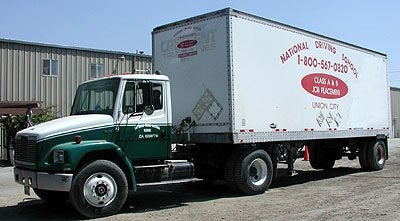How to pick a Truck Driving Training Program
TIPS FOR STUDENTS TO CONSIDER BEFORE ENROLLING AT A PRIVATE POSTSECONDARY SCHOOL
To get the most out of your educational experience, do your homework and make an informed decision before making a commitment. The following list of “enrollment tips” is provided to assist students in determining what steps they may want to take when considering enrollment at a private postsecondary educational institution, or postsecondary “school.”
 1. INVESTIGATE THE SCHOOL YOURSELF BEFORE ENROLLING.
1. INVESTIGATE THE SCHOOL YOURSELF BEFORE ENROLLING.
Prior to enrolling, interview students in the program, or take a tour of the school. Ask if the school will let you sit in or observe the class or course that you are interested in before enrolling.
2. CONTACT THE BUREAU OR CHECK OUR WEB SITE TO SEE IF THE SCHOOL IS APPROVED TO OPERATE IN CALIFORNIA, AND WHETHER THERE IS A RECORD OF DISCIPLINE.
Watch out for schools that are not approved by the Bureau, schools that have had an extreme number of complaints in a short amount of time, or have a record of discipline (e.g., probation, suspension). If the school is not approved, you could end up with a diploma or degree that is not recognized and a lot of debt and little, or no education. A school with a high number of complaints or a record of discipline may indicate that the school is not meeting minimum standards for instructional quality or institutional stability.
3. GET A COPY OF THE STUDENT CATALOG.
A school’s catalog contains important information that you will need to review prior to making a decision to enroll. Pay special attention to school policies, such as attendance, leave-of-absence, cancellation and refund.
4. GET A COPY OF AN ENROLLMENT AGREEMENT TO REVIEW ALL BINDING TERMS, CONDITIONS, COSTS AND STUDENT DISCLOSURES.
An enrollment agreement should reflect information about the school’s total costs for the contracted-for course of instruction, a list of the charges that are non-refundable, the name and description of the program of instruction, the total amount of classes or hours needed to complete the program, payment schedules, cancellation and refund policies, and other mandatory disclosures regarding your rights and responsibilities as a student at the institution. (Education Code section 94810.)
5. CONTACT THE ACCREDITING AGENCY THAT THE SCHOOL CLAIMS TO HAVE ACCREDITATION FROM AND VERIFY THE SCHOOL’S CLAIMS.
To qualify for some state licensing examinations or for your degree to be recognized by certain employers, some educational programs and training must be obtained from a school that maintains “accreditation” from a U.S. Department of Education recognized accrediting agency. Be sure to check with the licensing agency or employer where you wish your educational experience to be recognized and verify accreditation status with the accrediting agency before enrolling. For more information about accreditation and to obtain a list of Regional and National Accrediting Agencies, visit the U.S. Department of Education Web site.
6. REVIEW ALL ADVERTISING CAREFULLY AND COMPARE WHAT IS BEING ADVERTISED WITH WHAT IS DISCLOSED IN THE SCHOOL’S CATALOG AND COURSE SYLLABUS.
Make sure that the school is being truthful in what has been advertised. Watch out for hidden costs and promises that seem too good to be true.
7. REQUEST TO SEE THE SCHOOL’S STUDENT COMPLETION AND JOB PLACEMENT RATES.
A “student performance fact sheet” enables you to check to see whether students are staying in the class and finishing the course, and whether the school is assisting students in finding jobs after they have completed the course.
8. FIND OUT WHAT THE SCHOOL NEEDS FROM YOU.
If you are transferring from another school or enrolling for the first time at a post-secondary school, make sure you inquire as to what documents you will need to submit when you enroll.
9. MAKE SURE YOU KNOW THE AMOUNT AND TYPES OF FINANCIAL AID YOU WILL NEED BEFORE YOU ENROLL.
There are several options in obtaining financial aid to attend a school. Make sure you know whether you are going to receive or need Federal student loans, Pell grants, private loans or a combination of grants and loans, and understand what the advantages and disadvantages are of obtaining each type of loan or grant. Make sure you know the total amount of loans you are to receive. Match the amount of the loans against the total cost of tuition. For more information on financial aid, contact EDFund at http://www.edfund.org/, or the California Student Aid Commission at http://www.csac.ca.gov.
10. GET EVERYTHING IN WRITING.
Never accept a promise to deliver a service verbally. Make sure all contracted-for services are in writing and signed by a school official before you sign the enrollment agreement.
11. KEEP A COPY OF YOUR DOCUMENTS!
If you decide to enroll in a private postsecondary school, be sure to keep a copy of all contracts, policies, catalogs, disciplinary actions, attendance records, letters you’ve written to the school, etc. In the future, you may need to verify your payment obligations, any refunds owed to you by the school, or the educational services that you contracted to receive from the school.
12. LASTLY – ENJOY YOUR EDUCATIONAL EXPERIENCE!
National Truck Driving School is accredited from a U.S. Department of Education!
Visit the U.S. Department of Education Web site at: http://www.ed.gov/admins/finaid/accred/index.html
Why Choose Us?
- Se Habla Español
- Rehabilitation Vouchers Accepted
- Excellent Training Equipment
- Job Placement Assistance
- Payment Plans Available
- No Credit Check
- Day, Evening and Weekend Classes Available
